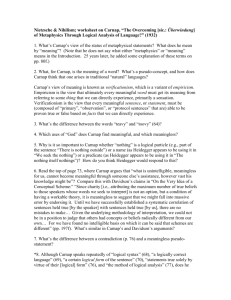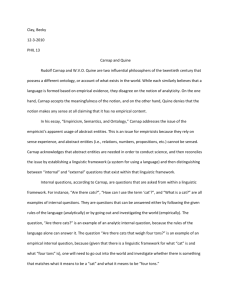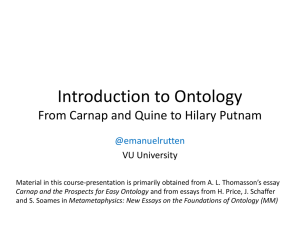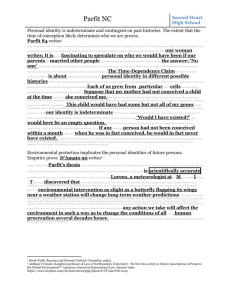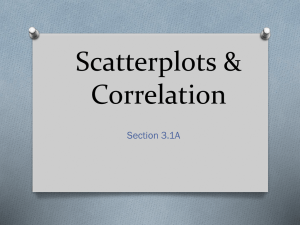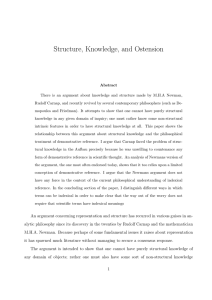Annotated bibliography part 3
advertisement
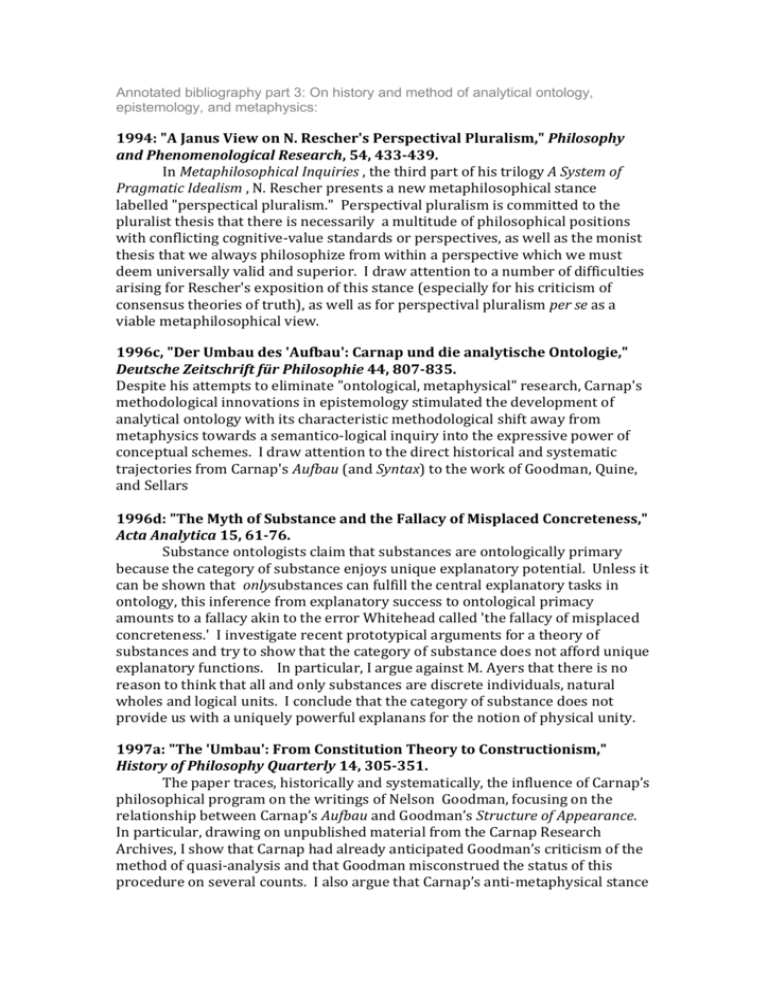
Annotated bibliography part 3: On history and method of analytical ontology, epistemology, and metaphysics: 1994: "A Janus View on N. Rescher's Perspectival Pluralism," Philosophy and Phenomenological Research, 54, 433-439. In Metaphilosophical Inquiries , the third part of his trilogy A System of Pragmatic Idealism , N. Rescher presents a new metaphilosophical stance labelled "perspectical pluralism." Perspectival pluralism is committed to the pluralist thesis that there is necessarily a multitude of philosophical positions with conflicting cognitive-value standards or perspectives, as well as the monist thesis that we always philosophize from within a perspective which we must deem universally valid and superior. I draw attention to a number of difficulties arising for Rescher's exposition of this stance (especially for his criticism of consensus theories of truth), as well as for perspectival pluralism per se as a viable metaphilosophical view. 1996c, "Der Umbau des 'Aufbau': Carnap und die analytische Ontologie," Deutsche Zeitschrift für Philosophie 44, 807-835. Despite his attempts to eliminate "ontological, metaphysical" research, Carnap's methodological innovations in epistemology stimulated the development of analytical ontology with its characteristic methodological shift away from metaphysics towards a semantico-logical inquiry into the expressive power of conceptual schemes. I draw attention to the direct historical and systematic trajectories from Carnap's Aufbau (and Syntax) to the work of Goodman, Quine, and Sellars 1996d: "The Myth of Substance and the Fallacy of Misplaced Concreteness," Acta Analytica 15, 61-76. Substance ontologists claim that substances are ontologically primary because the category of substance enjoys unique explanatory potential. Unless it can be shown that onlysubstances can fulfill the central explanatory tasks in ontology, this inference from explanatory success to ontological primacy amounts to a fallacy akin to the error Whitehead called 'the fallacy of misplaced concreteness.' I investigate recent prototypical arguments for a theory of substances and try to show that the category of substance does not afford unique explanatory functions. In particular, I argue against M. Ayers that there is no reason to think that all and only substances are discrete individuals, natural wholes and logical units. I conclude that the category of substance does not provide us with a uniquely powerful explanans for the notion of physical unity. 1997a: "The 'Umbau': From Constitution Theory to Constructionism," History of Philosophy Quarterly 14, 305-351. The paper traces, historically and systematically, the influence of Carnap’s philosophical program on the writings of Nelson Goodman, focusing on the relationship between Carnap’s Aufbau and Goodman’s Structure of Appearance. In particular, drawing on unpublished material from the Carnap Research Archives, I show that Carnap had already anticipated Goodman’s criticism of the method of quasi-analysis and that Goodman misconstrued the status of this procedure on several counts. I also argue that Carnap’s anti-metaphysical stance left his approach with an explanatory deficit which Goodman’s pragmatist pluralism is able to address. 2000a: “Constitution Theory and Metaphysical Neutrality: A Lesson for Ontology?” The Monist 83, 161-183. Carnap’s thought not only played a pivotal role for the development of formal semantics and modern philosophy of science, but also engendered the profound methodological reorientation that distinguishes analytical from traditional ontology. Set out in the Aufbau and modified in Syntax, Carnap presented a deflationary approach to traditional category theory, arguing that the latter can be considered as a derivational systematization of cognitive contents which may remain metaphysically "neutral." Carnap's 'neutralism thesis' is taken to imply the stronger 'elimination thesis,' Carnap's explicit antimetaphysical pronouncements that stand and fall with semantic verificationism. Against this I show, first, that the neutralism thesis is historically and systematically independent of the elimination thesis. Second, I argue that, unlike the elimination thesis, the neutrality claim and Carnap's attempt to cash it out in the Aufbau is important for the methodology of contemporary ontology, at least where it follows constructivist predilections. Third, I draw attention to the fact that Carnap's neutrality claim in the Aufbau is supported by an implicit conception of reality as invariance-structure which, however, threatens the explanatory aspirations of constitution theory. This tension between neutrality and explanatory power sheds new light on the notion of "foundedness," Carnap's curious restriction on the interpretation of the system's basic relation. While this restriction has struck some as outright incoherent, I suggest that it can be viewed more cheritably as an acknowledgement of the explanatory character of ontology, as the distinctive constraint where ontology and formal semantics part company. 2000c: “Fission, Sameness, and Survival: Parfit’s Branch Line Argument Revisited,” Metaphysica 2, 96-134. Parfit’s Branch Line argument is intended to show that the relation of survival is possibly a one-many relation and thus different from numerical identity. I offer a detailed reconstruction of Parfit’s notions of survival and personal identity, and show the argument cannot be coherently formulated within Parfit’s own setting. More specifically, I argue that Parfit’s own specifications imply that the “R-relation”, i.e., the relation claimed to capture of “what matters in survival,” turns out to hold not only along but also across the branches representing the development of a reduplicated person. This curious fact of ‘interbranch survival,’ as I call it, has gone unnoticed so far. The fact that the R-relation also holds across branches creates a trilemma for Parfit’s approach. Either the envisaged notion of personal identity is circular, or the Rrelation fails as a reconstruction of the common sense notion of survival, or talk about persons ‘branching’ (being reduplicated etc.) remains semantically empty. In the paper’s last section I suggest that my criticism does not detract from the larger systematic significance of Parfit’s argument. The argument is simply terminologically miscalibrated. Even though Parfit’s branch line argument fails to establish the conceptual separability of survival and identity, it can be used to show the separability of sameness and numerical identity, which should have similar implications for meta-ethics as the original argument. 2001: "Ontological Categories: the Explanation of Categorial Inference", in: Wahrheit—System – Struktur: Auseinandersetzungen mit Metaphysik, ed. by D. Greimann et al. (Olms-Verlag) 263-288.
